5 reasons to outsource your app development to Croatia
Outsourcing app development is becoming popular because of the many benefits clients can reap when they choose this approach.
Now, when you think of outsourcing, which destination comes to mind?
It’s probably India, Poland, or Ukraine. Sometimes, Brazil or Argentina gets on the list.
But one country many people leave out is Croatia.
This is a shame because this beautiful country is also home to some of the world’s top app developers and designers.
And it’s considered a rapidly growing hub of innovation and technology in the region.
Of course, to be fair, anyone online can claim the same thing about their country.
So here are five reasons why Croatia should be your next outsourcing destination.
Table of Contents
Great value for the cost
One large advantage of outsourcing Croatian developers is the relatively lower development cost.
That’s because the country is part of Eastern Europe. This region boasts significantly more affordable rates than Western Europe or North America.
Take a look:
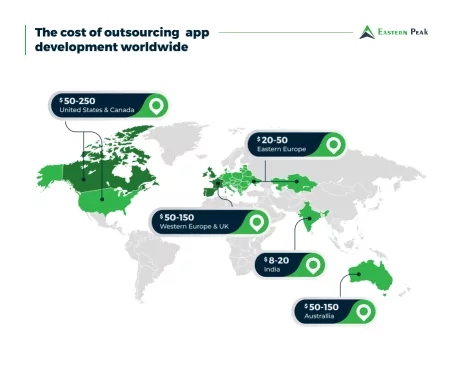
Source: Eastern Peak
Croatia also sports one of the lowest developer costs in the region.
The average hourly rate is around $37-$74 per hour, lower than what a German or Swiss developer would charge (around $50-$99 per hour).
Croatia is affordable even compared to some other countries in the region.
However, lower cost doesn’t mean lower quality.

The great thing about Eastern Europe is that the value local developers offer is on a par with top developers from Western Europe and North America.
It’s why the region is increasingly becoming popular for outsourcing.
Croatia consistently provides immense value for money, a fact clearly shown by the wage-adjusted labor productivity ratio indicator.
It measures the output delivered by the workforce compared to its cost. The higher the number, the better value for money a country’s labor force is.
Now take a look at this chart of the wage-adjusted labor productivity ratios in the European Union:
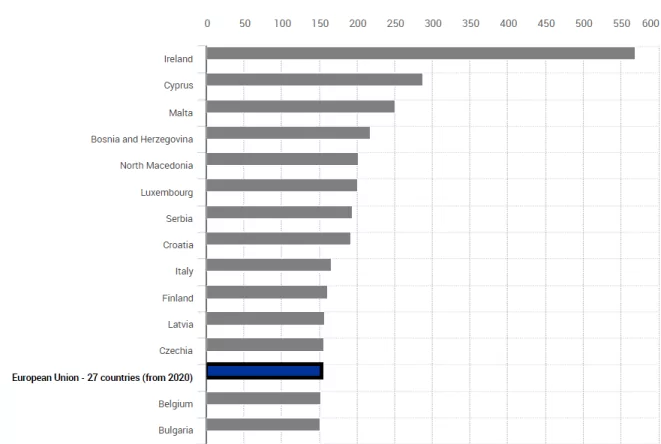
Source: Eurostat
Notice that Croatia has the 8th highest ratio in the region, even higher than some Western European nations like Finland, Italy, and Belgium. Moreover, Croatia’s score is significantly higher than the EU average.
In other words, Croatia offers a better ROI when it comes to software development.
Additionally, most workers in the country also have a strong work ethic.
Overall, Croatia offers affordable developer costs without sacrificing quality. This alone is reason enough to consider outsourcing development to the country.
A large pool of talent
As mentioned above, Croatia’s app development cost might be low, but the quality of the output certainly isn’t.
And one of the biggest reasons for that is the country’s large and diverse software talent pool.
Croatia boasts around 35,000 developers. You might think that’s insignificant compared to the rest of Europe.
But you might not know that the country’s developer pool has been growing by around 19% annually. In contrast, Europe’s average developer growth is only about 6%.
You can see the steady growth of Croatia’s IT pool in this infographic:
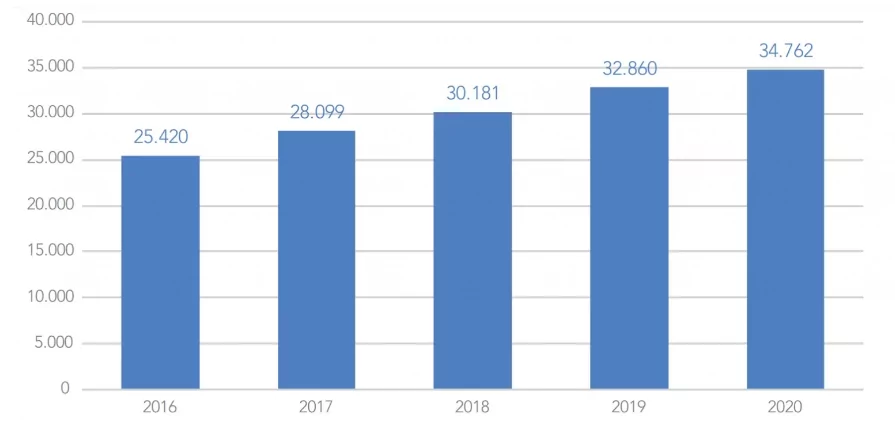
Source: Ekobit
Croatia is also an emerging destination in software development, especially bespoke projects and mobile apps.
Moreover, the country is also heavily invested in servicing finance and healthcare companies—two of the most technically challenging niches in the world.
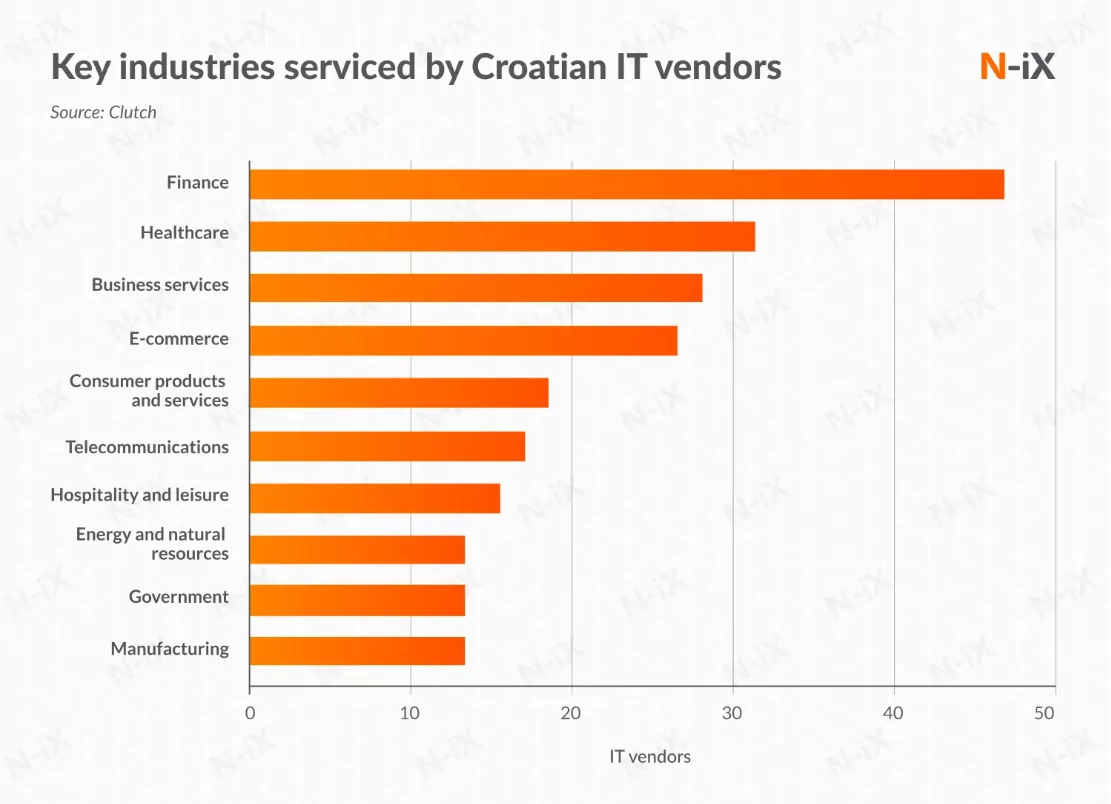
Source: N-ix
Croatia owes its diverse IT pool to its innovation-forward culture, thanks to a history full of inventive men and women.
Nikola Tesla, arguably one of the brightest minds of the last century, is a native of the country.
Croats are also responsible for many of history’s inventions, including the zeppelin, pen, and the electric sports car.
This rich heritage is complemented by the government’s dedication to tech education.
Croatia is home to some of the region’s best colleges and universities with world-class computer science education.
Here’s a study by Eurostat to back up this claim:
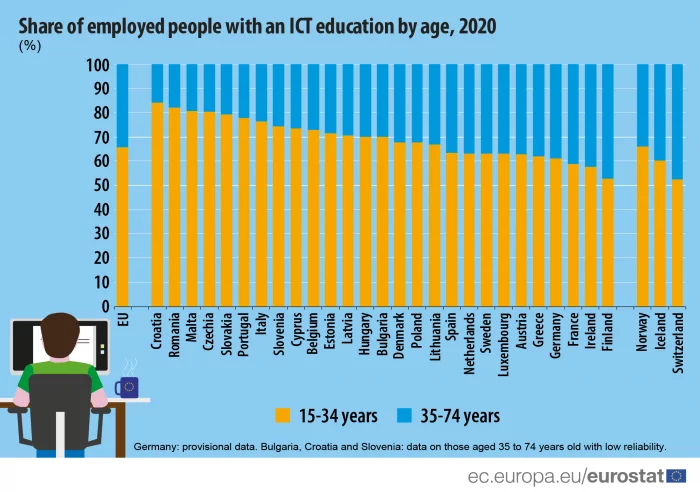
Source: Eurostat
As you can see, over 80% of Croatia’s young IT workforce (those below 34 years old) went through formal ICT education—the highest in Europe.
But a tech education isn’t just limited to tertiary institutions.
Early on, kids are already encouraged to undertake STEM (science, technology, engineering, and mathematics) subjects—areas of study that are crucial for software development.
That gives Croatian students an edge.
The biggest proof of this is the International Olympiad in Informatics (IOI), the most prestigious computer science competition for students below 20 years of age.
Croatia has had an incredible run at the IOI, boasting a total of 100 medals, placing it 14th in the world.
What’s more impressive is that Croatia has a smaller population than other countries on the list. Thus, it has the most number of medals per 100,000 people, as this graph shows:
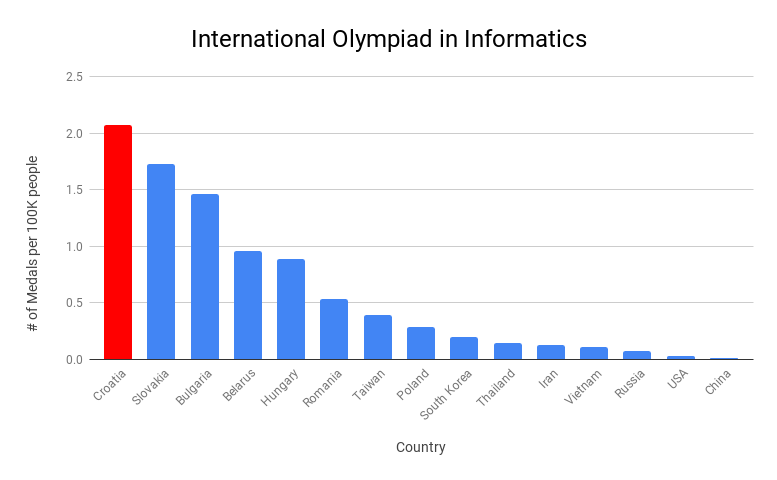
Source: Medium
In other words, Croatia has the world’s best programming talent per capita.
No wonder you’ll see the same skill and diversity in the talent pool of Croatian software development agencies—DECODE included.
We’re proud of our group of 70+ professionals with diverse skills in coding, UX, design, and engineering.
That gives us the flexibility to form a team that can tackle any technical issue in any project.
One proof of our technical competence is our extensive experience developing fintech apps, considered one of the hardest development niches.
That’s because this niche requires skills most developers don’t have, such as cybersecurity and financial compliance.
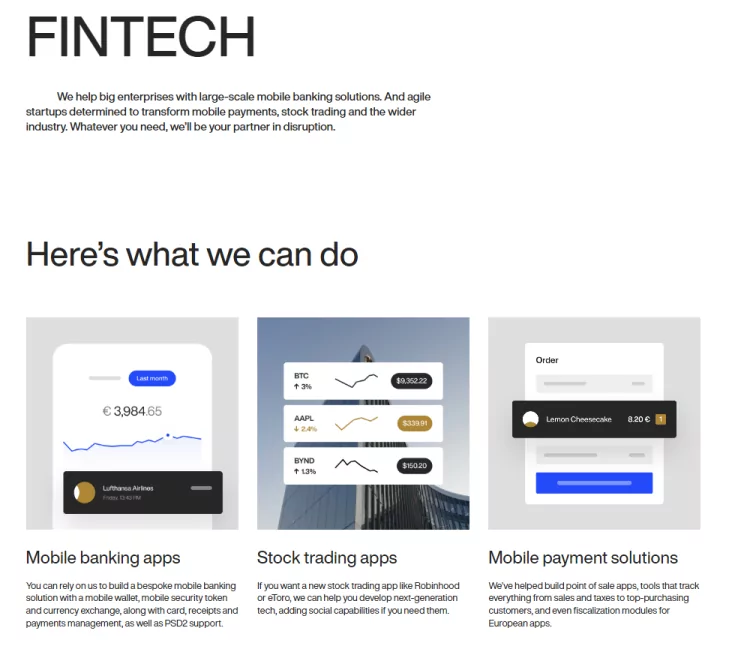
Source: DECODE
The evidence couldn’t be clearer—if you need the most skilled yet reasonably-priced developers, look no further than Croatia.
With a young and skilled ICT workforce that’s steadily growing annually, you’ll never run out of top talent to work on your project.
Familiar culture
One thing that surprises many people who work with Croatian developers is how familiar it all seems.
That’s because the country fosters a Western culture, much like the rest of Europe and North America.
Most clients will find that collaboration with Croats is easier than with developers from other popular outsourcing countries, such as those from East Asia, for example, due to fewer cultural barriers getting in the way.
This is important because a bad cultural fit frequently leads to a project failing, according to an Accenture statistic:
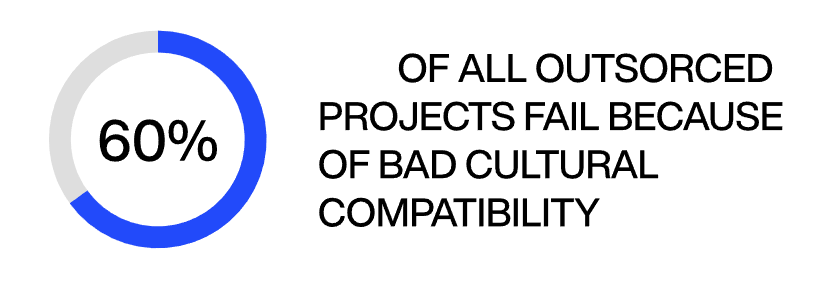
Source: Accenture / Santex
Croatians also embody a strong work ethic, which makes them reliable service providers—a great edge in outsourcing work.
For one, they pride themselves on their competitiveness, and excellence. Thus, any task given to them has a high chance of getting done with outstanding results.
Another great thing about Croatian developers is that they’re fantastic team players. They believe that great work results from tight collaboration, which shows during app development.
They are very loyal to their team or company and will work hard for the group’s greater good.
To top it all off, Croats have one of the best English skills compared to the other non-native English-speaking countries in the region.
Very high English proficiency
If you’ve tried outsourcing to non-English speakers before, you know how challenging it can be.
Many nuances in language can be lost in translation, leading to developers and clients misunderstanding each other.
This results in poor quality, project delays, and unnecessary costs.
Indeed, poor communication is the leading cause of failure for outsourcing projects.
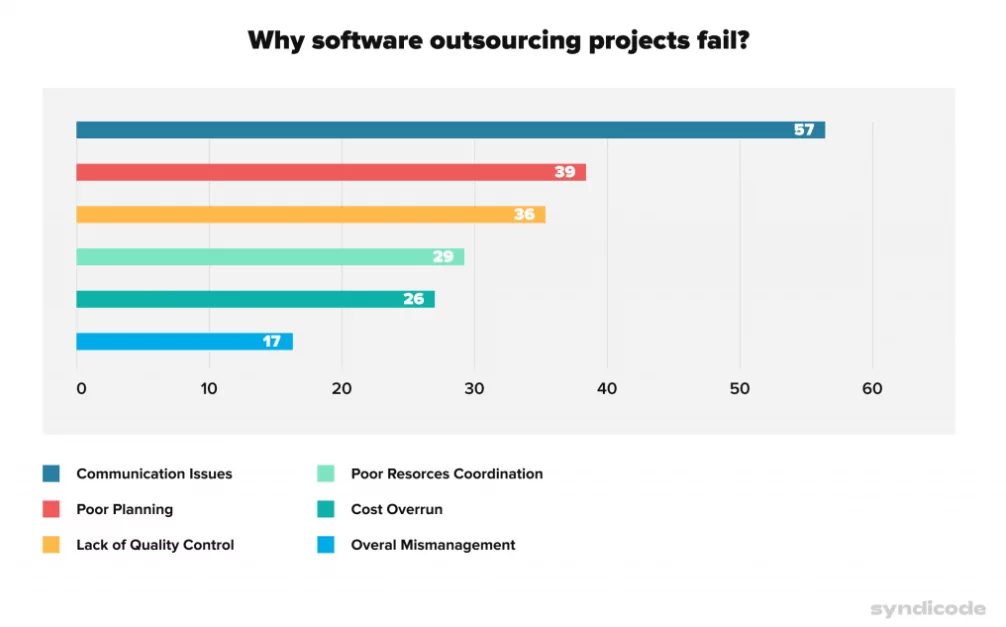
Source: Syndicode
Fortunately, you won’t have these problems with Croatian developers, as they usually speak English very well.
Based on the English First English Proficiency Index (EF EPI), which measures a country’s overall English skills, Croatia ranks tenth worldwide, and ninth in Europe—the highest among Central and Eastern European nations.
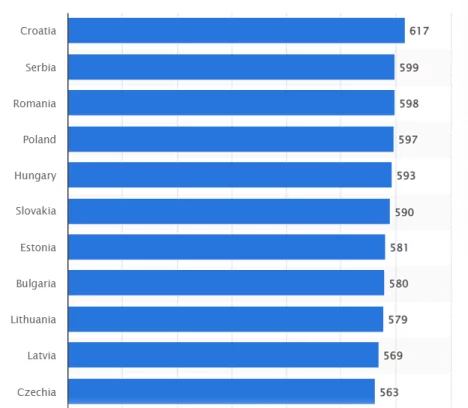
Source: Statista
Indeed, English isn’t the only language Croatians are proficient in. As many as 80% of citizens are multilingual, with many speaking German and Italian.
That gives them a huge edge when dealing with clients from other non-English-speaking nations in Europe.
Croatia’s English proficiency is no accident. The Croatian government requires schools to teach foreign languages from an early age.
And by far, the most popular choice is English:
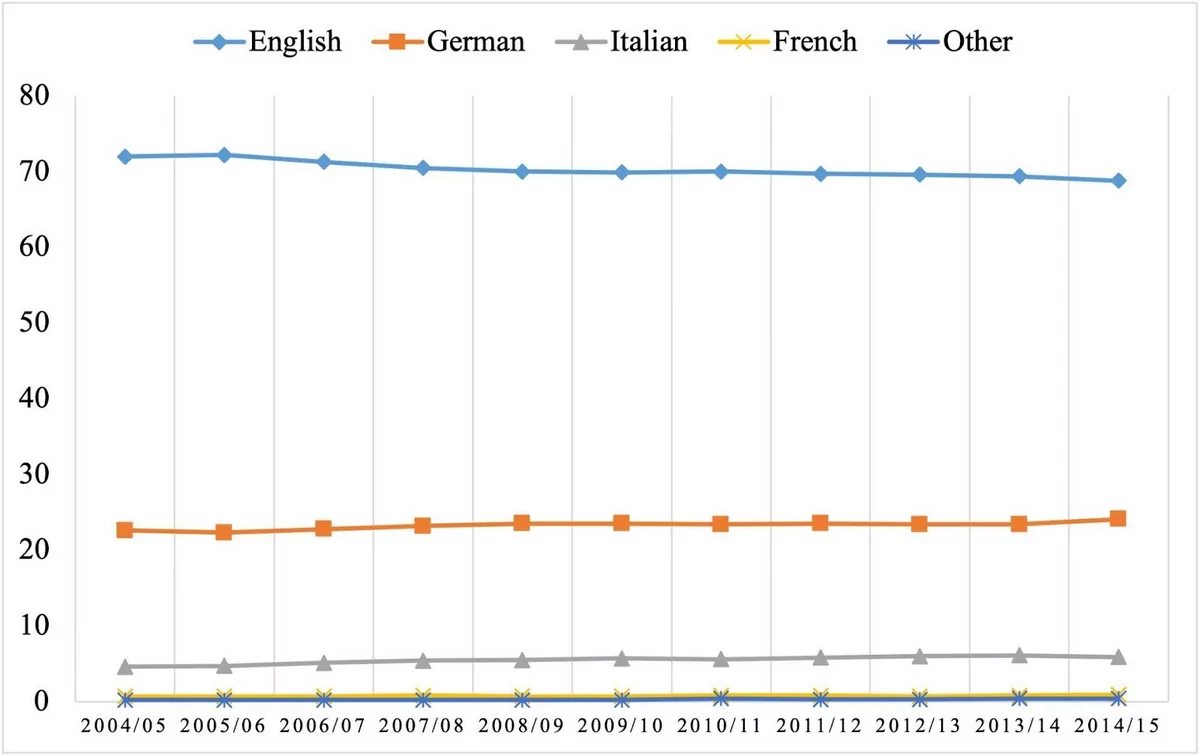
Source: PELC
Thus, children as young as six start learning English as a second language when they begin elementary school.
It’s also part of the core curriculum in all secondary schools and many universities.
Croatia also has a significant tourism industry, so regularly communicating with foreigners is necessary.
Of course, this also benefits clients who need to outsource software development to the country.
So if you want to work with a foreign team without the usual language barriers, Croatia is a great pick.
Easy collaboration
So far, we’ve discussed how easy it is to work with Croatian developers thanks to their strong work ethic and excellent English skills.
But there’s more to it than that.
Another edge that Croatia has over other countries in the world is the fact that it’s part of the European Union.
For clients from most Western European countries, this makes working with fellow EU members easy and familiar because you’re under similar laws and regulations.
The EU is also a great region for app development, thanks to the General Data Protection Regulation (GDPR).
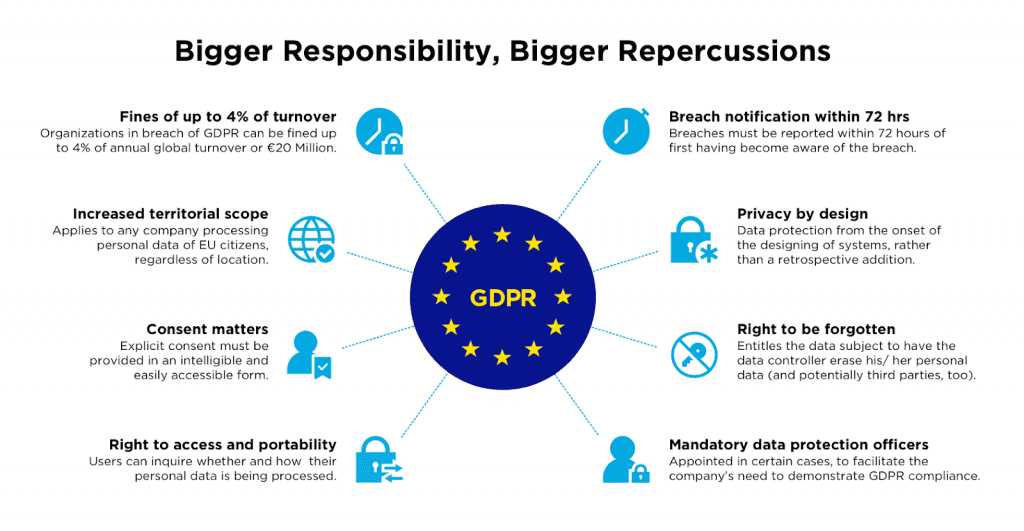
Source: Emotiv
Many consider the GDPR one of the strictest such regulations in the world. This is good because it can help make your app more secure.
On the flip side, though, compliance with GDPR can be difficult. And even a small mistake can lead to hefty fines.
However, this wouldn’t be a problem if you work with Croatian developers, who’ll know exactly how to comply with the regulation.
Furthermore, Croatia is in a similar time zone as some of the most outsourcing-heavy nations in Europe, like Spain and Germany.
At most, the time difference with other parts of Europe is only 1–3 hours, making real-time collaboration easier.
The country is also just a mere 6 hours away from cities in the eastern United States, like New York. That gives them plenty of overlap in their schedules for real-time communication.
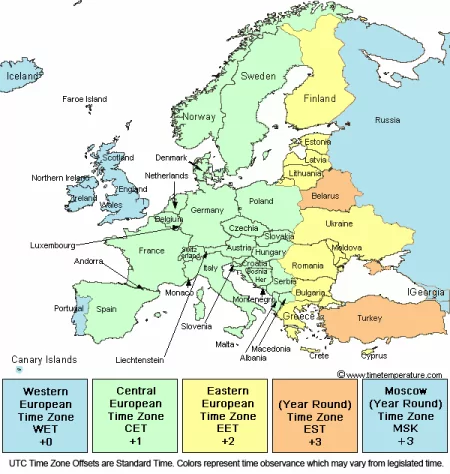
Source: Time Temperature
Because Croatia is situated in the middle of Europe, the ease of collaboration goes beyond remote meetings. It’s also easy to travel there.
The country is well-connected via highway with other European nations, and most cities are just a short plane ride away.
Best of all, Croatia is one of the safest countries in the region. Indeed, you’ll feel safe walking along its streets even in the wee hours of the morning.
This isn’t just anecdotal. It is supported by evidence. According to a Eurostat study, only 2.7% of the population reported a serious crime in their area.
It’s way below the EU average of 11% and the leader Bulgaria, which has a rate of 20.2%.
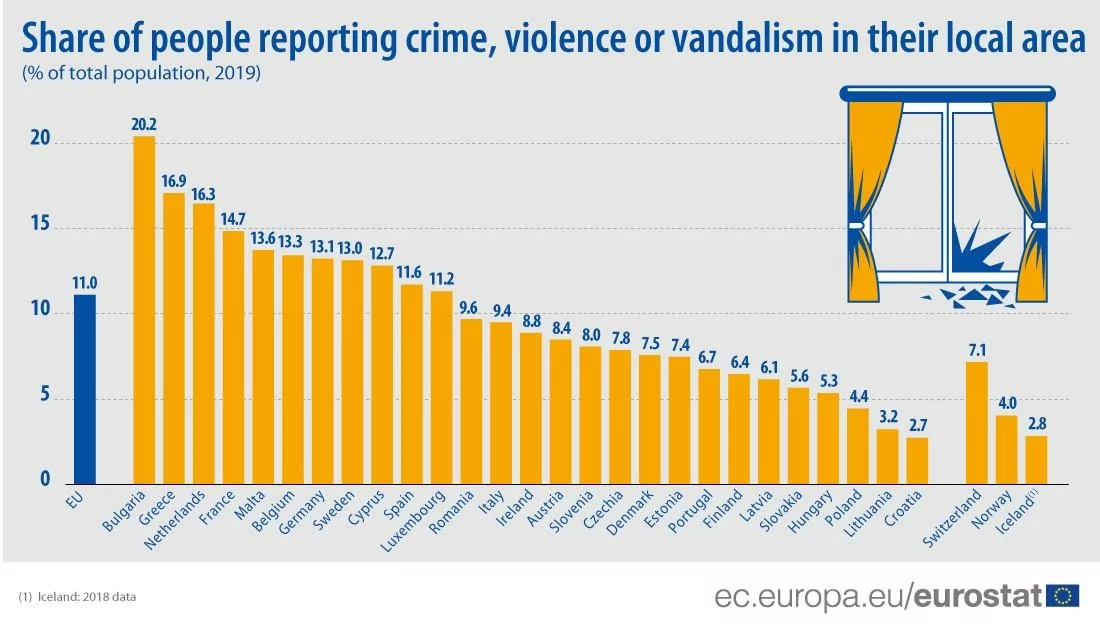
Source: Croatia Week
Overall, Croatia has plenty of factors that make collaborating with developers there seamless and effortless, making Croatia an outsourcing hotspot.
Croatia is an underrated ICT hotspot.
The assessment above comes from the 2022 Future of IT Report, a review of the current state of IT competitiveness in Europe.
And it perfectly sums up the untapped potential of Croatia.
But being underrated is a good thing—because it means you don’t have much competition for outsourced talent.
So, if you want the best app development experience, you can’t go wrong with Croatia, especially if you pick one of the top agencies in the country, like DECODE.
With our extensive experience and wide skill set, we believe we have what it takes to bring your project to life.
Interested in getting the best that Croatia has to offer? Get in touch with us today, and let’s talk!
